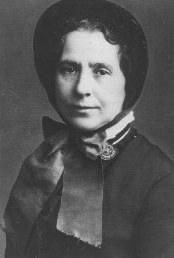Catherine Booth
Catherine Booth b. Mumford (born January 17, 1829 in Ashbourne , Derbyshire , England , † October 4, 1890 in Clacton-on-Sea, Essex , England), was the wife of William Booth , the founder of the Salvation Army . She played a key role in founding and organizing the Salvation Army. She is considered a champion for women's rights .
Life
Catherine Mumford was the daughter of a Methodist lay preacher , who received a comprehensive education from her mother and developed a Christian feeling for social issues as a child. (She is believed to have read the Bible eight times by the age of twelve.) As a young girl, she worked as a secretary for a youth abstinence movement and wrote articles for magazines warning of the dangers of alcoholism .
In 1844 she moved to London with her parents. In 1852 she, who had joined the Methodist New Connexion , met the Methodist pastor William Booth. The two found each other in a shared commitment to Christian social action, but were of very different opinion when it came to the role of women in the Church: Catherine strongly advocated the right of women to preach.
In 1855 she married William Booth. During the early years of their marriage, she lived according to the role of a Methodist pastor's wife, holding Sunday school and Bible study for the women. At the same time, however, she wrote theological treatises in which she argued for women's rights based on the Bible .
In 1860, as the mother of four children, she gave her first sermon . When William Booth began to work as a revival minister in Cornwall and Wales in 1861 , she also preached; three years later, her sermons were valued more than his.
When the work of the Christian Mission , as the Salvation Army was first called, began in London's East End in 1865 , she was on the front line as an evangelistic preacher from the start.
In the construction years of the Salvation Army, Catherine Booth was a preacher and theologian of the movement, represented her sick husband for months in the leadership, organized meals for the poor (where she cooked 300 meals herself for about Christmas) and brought countless factory workers into the movement, which she then brought in several months of courses. She also raised eight children, seven of whom were involved in the leadership of the Salvation Army.
Out of her Christian conviction, she was also involved in social policy, wrote to the Queen and MPs, fought against prostitution and demonstrated for better working conditions, especially for women.
She died of cancer on October 4, 1890 . 36,000 people attended her funeral.
Works
- The right of women to preach , DFS, Cologne 2000, ISBN 3-905499-26-6 (translation by Female Ministry also included in Practical Religion ).
- Popular Christianity (English).
- Female Ministry or, Woman's Right to Preach the Gospel (English) , 1859 (contained in book Papers on Practical Religion )
- Female Teaching (English) , 1861
- Papers on Practical Religion (English) , 1879
- Aggressive Christianity : practical Sermons (English) , 1881
- Papers on Godliness (English) , 1882
- Life and Death . Being reports of addresses delivered in London (English), 1883;
- The Salvation Army in Relation to the Church and State, and other addresses …, With an appendix on the so-called "Secret Book" (English), 1883
- The Iniquity of State Regulated Vice . A speech (English) , 1884
literature
- Erich Geldbach, Christine Kenning: Equal Rights in Uniform? Gender relations in the Salvation Army yesterday and today. Lit, Münster 2003 ISBN 978-3-8258-6662-4 ( Ecumenical Studies Series , 29)
- Roger J. Green: Catherine Booth. Servant of the poor, conscience of the rich, advocate of the lost; the "mother of the Salvation Army" (Original: Catherine Booth ) Translated by Markus Baum. Brunnen Verlag (Gießen) 2010 ISBN 978-3-7655-1745-7
- Dave and Neta Jackson: Alone in London. William and Catherine Booth Christian Literature Distribution, Bielefeld 2005, ISBN 978-3-89397-447-4
- Trevor Yaxley, Carolyn Vanderwal: William and Catherine Booth. Life and Legacy of the Salvation Army Founders. (Original: The Life and Legacy of the Booths, Founders of the Salvation Army ) Translated by Markus Häßlein. Adullan, Grasbrunn 2007 ISBN 978-3-931484-35-4
Web links
- Literature by and about Catherine Booth in the catalog of the German National Library
- Catherine Booth. In: FemBio. Women's biography research (with references and citations).
Individual evidence
- ↑ a b Randall Herbert Balmer: Booth, Catherine (née Mumford) (1829-1890) . In: Encyclopedia of Evangelicalism . Baylor University Press, Waco 2004, ISBN 1-932792-04-X , pp. 92 (English).
| personal data | |
|---|---|
| SURNAME | Booth, Catherine |
| ALTERNATIVE NAMES | Mumford, Catherine |
| BRIEF DESCRIPTION | Mrs. William Booths, the founder of the Salvation Army |
| DATE OF BIRTH | January 17, 1829 |
| PLACE OF BIRTH | Ashbourne, Derbyshire , England |
| DATE OF DEATH | October 4, 1890 |
| Place of death | Clacton-on-Sea, Essex , England |

